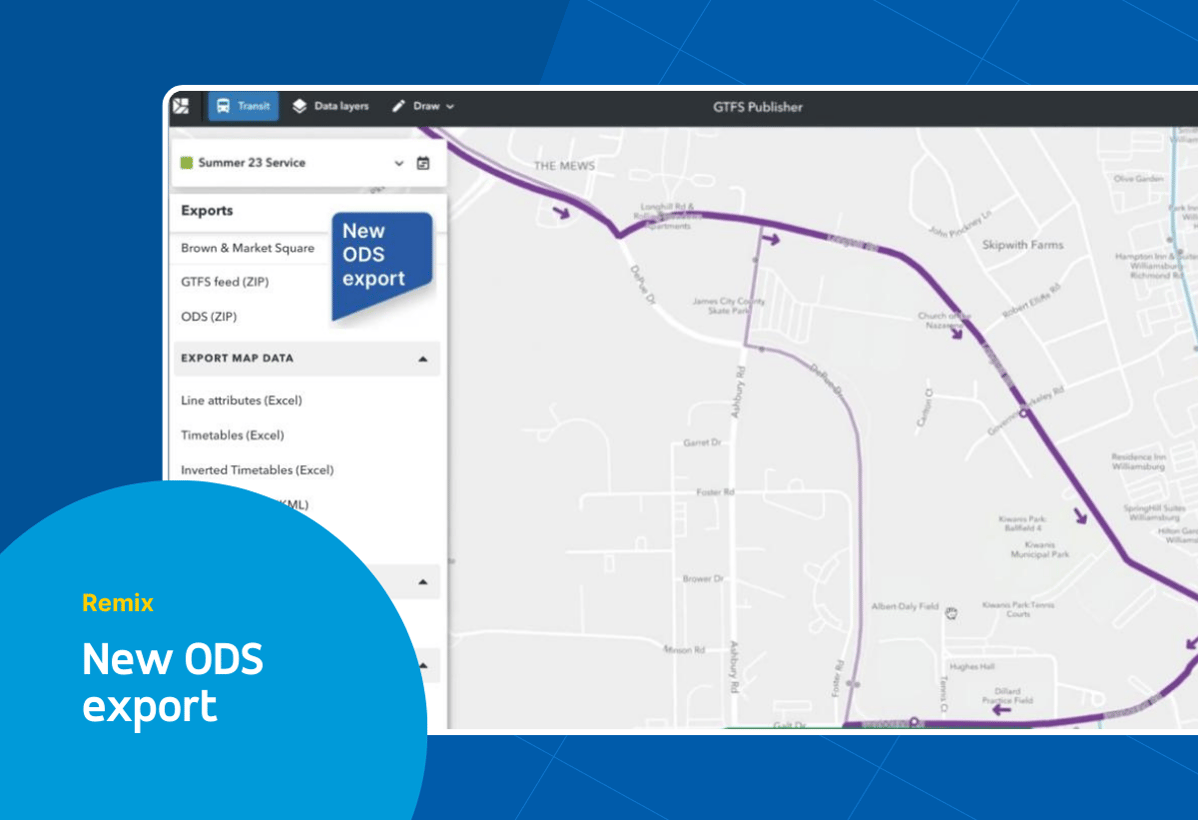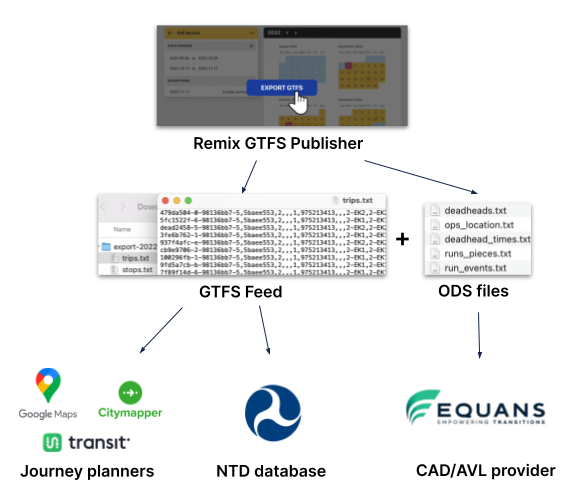Planning new services, scheduling drivers, dispatching vehicles, monitoring daily service — over the past 5-10 years, transit agencies have embraced new technologies to help with all kinds of tasks. But for the planners, schedulers, dispatchers, and operators on the ground, these disparate software packages introduce a new challenge: efficient communication across departments and between tools. Without proper integrations, a simple task like updating a file could take days. And that’s where software optimized to emerging data standards, like the new Operational Data Standard (ODS), can help.
Recently, Remix Planning and Scheduling software became the first platform to deliver a directly-exportable version of ODS , extending the capabilities of its already-powerful GTFS publisher to accommodate the additional operational fields reflected in the new standard. With ODS in Remix, agencies can accomplish the following:
- Communicate smoothly with other tech providers that leverage ODS.
- Report operational data to regulators with ease.
- Bring on additional ODS-compatible software without the need for custom integrations.
ODS, GTFS, CAD/AVL — lots of letters, powerful outcomes
Finalized in May 2022, the ODS — a product of the California Integrated Travel Project, or Cal-ITP, which works to standardize the travel experience across California — is an extension of the General Transit Feed Specification (GTFS) that encompasses additional operational data, such as non-revenue service and personnel information, required by ITS and CAD/AVL systems. Just as GTFS facilitates the easy communication of rider-facing transit information to a range of third-party applications (such as journey-planners like Google Maps, Transit App, and Citymapper), ODS can do the same to transfer operational information to CAD/AVL.
With this new feature, life got a lot simpler at Greenlink in South Carolina, where the agency’s new Intelligent Transportation System (ITS) provider EQUANS worked with ODS files. Remix ODS Export saves Greenlink a game-changing amount of time. As James Keel, Greenlink’s Executive Director, explained, “[Without Remix,] you might get an email that says, ‘Hey, we need you to do something to the ODS file.’ And if you didn’t have that kind of immediate technology, it would take a day or two. [Now,] most of the time we can get this turned around in 15, 20 minutes.”
Moreover, by leveraging an existing data standard — rather than a custom integration — both Remix and EQUANS preserve Greenlink’s flexibility to procure new software or develop new workflows. “Having a standard that [other software programs] can consume without integration is extremely important,” said Keel.
A data-first transit agency sparks an impactful collaboration
At Greenlink, which offers paratransit and fixed-route bus service across Greenville County, South Carolina, data collection and data-sharing have long been top priorities. Greenlink’s young, vibrant team — three of whom have been featured in Mass Transit Magazine’s 40 Under 40 — understands that data is only as valuable as it is easily communicable, and has embraced open data standards and transparent data reporting as ways to keep an eye toward the future.
So when Keel approached Remix’s team to ask about extending GTFS publisher to include ODS fields, they saw it as an indication of what agencies all over the country would soon be looking to do. EQUANS, Greenlink’s new CAD/AVL provider, had already embraced ODS: as Hoki Tse, EQUANS project manager, explained, “As part of our standard offering within our CAD/AVL system, GTFS and ODS datasets together will be a gamechanger for Greenlink’s Operations and Scheduling staff to handle non-revenue operations such as deadheading, personnel runs, and bus facility locations with ease.”
Keel’s request sparked a three-team collaboration between Greenlink, Remix, and EQUANS to design, build, and test the new ODS Export feature. Now, just as Remix lets agencies edit GTFS implicitly as they complete planning and scheduling tasks within Remix’s graphic interface, Remix updates ODS data exactly when changes are made so that a fresh export is always a click away. The export not only saves time — it keeps Greenlink’s team focused on the future, ready to embrace new software and meet new regulatory requirements without overhauling their existing systems.


.png?width=71&height=47&name=Sioux%20Falls%20Webinar%20(6).png)


